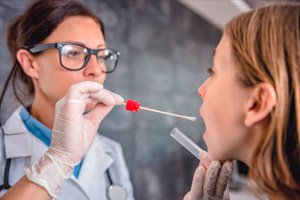
All iLive content is medically reviewed or fact checked to ensure as much factual accuracy as possible.
We have strict sourcing guidelines and only link to reputable media sites, academic research institutions and, whenever possible, medically peer reviewed studies. Note that the numbers in parentheses ([1], [2], etc.) are clickable links to these studies.
If you feel that any of our content is inaccurate, out-of-date, or otherwise questionable, please select it and press Ctrl + Enter.
Saliva-Based Breast Cancer Test Could Be Coming Soon
Last reviewed: 09.08.2025

In a small new study, a handheld device for collecting saliva samples successfully detected breast cancer 100 percent of the time, researchers reported.
The study used only 29 saliva samples, and more research is needed.
But the results remain "very exciting because this device could improve access to breast cancer screening and significantly reduce health care costs," said study co-author Dr. Coy Heldermon, a breast oncologist at the University of Florida Medical Center in Gainesville.
"If confirmed, this will be a game changer," he added in a university press release.
Access to screening remains a barrier to early detection of breast cancer when it is most treatable.
The American Cancer Society currently recommends that women at average risk have their first mammogram at age 40 and an MRI if they have certain risk factors, such as a family history of the disease.
Of course, mammograms can be uncomfortable and require an appointment. Senior study author Dr. Josephine Esquivel-Upshaw is especially aware of this: her mother died of breast cancer, and she is at high risk.
Esquivel-Upshaw gets mammograms and breast MRIs every six months. “It’s a hassle and can be demoralizing,” she said. “I’d much rather have a simple saliva test at home that could indicate the next steps in screening.”
So a team in Florida is creating a device that does just that.
It is a "biosensor" that measures specific breast cancer biomarkers hidden in saliva.
In their latest work, “we were able to shrink the sensor platform down to fit in the palm of your hand, which was our main goal: to make it accessible and portable for patients,” Esquivel-Upshaw said.
"The portable design means it is a promising alternative for breast cancer detection and monitoring, particularly in rural communities," she added.
The technology was developed in collaboration with Yu-Tie Liao, a professor of electrical engineering at National Yang Ming Chiao Tung University in Taiwan.
Scientists at the University of Florida and their Taiwanese partners have created a high-tech circuit board with "multi-channel test strips" designed to detect a range of biomarkers in saliva unique to breast cancer.
The patient's saliva is collected in a sterile cup, and the device's test strip is dipped into the sample for about three seconds, the researchers explained.
The strip is then inserted into a slot on the device's printed circuit board.
With the help of a special application, test results can be accessed in real time.
In a small study involving 29 saliva samples, the biosensor was 100% accurate in identifying people who had been diagnosed with breast cancer.
It correctly identified the absence of the disease in healthy people 86 percent of the time, the researchers reported.
They believe the device could be used initially to determine whether a person needs to be referred for further testing, such as a mammogram.
“You send a little saliva or, better yet, get the device yourself, take a measurement, and if it’s positive, you’re sent for more testing,” Helderman explained in a press release. “It’s much more practical and will have a much better response from patients.”
What's next? The team, which already holds patents on the device, says it is now testing other biomarkers in saliva to see which combination of biomarkers best predicts breast cancer.
They say the technology could one day help detect a range of diseases, not just breast cancer.
The study was recently published in the journal Biosensors.
